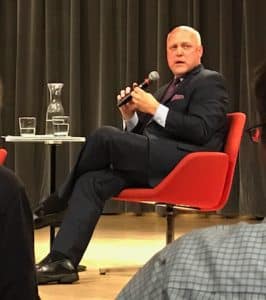
Mayor Mitch Landrieu addresses a crowd of community members at the New Orleans Jazz Market as he reflects on his office’s restoration efforts to rebuild the city after Hurricane Katrina. (photo by Nurah Lambert)
Story by Canela Lopez
canelalopez@nolamessenger.com
Soon to leave a seven-year mayoral tenure behind him, New Orleans Mayor Mitch Landrieu addressed a crowd of community members at the New Orleans Jazz Market as he reflected on his office’s restoration efforts to rebuild the city after Hurricane Katrina.
Hosted by EngageNOLA, a nonprofit organization, the event –“A Talk with the Mayor: A Civic Engagement Social”– aimed to provide citizens with a platform to pose questions directly to Landrieu in an organized fashion.
A wide array of issues that marked Landrieu’s time as mayor were discussed, such as citywide reconstruction and affordable housing. Sheba Turk, WWL-TV Eyewitness Morning News Anchor, moderated the event and posed questions from the audience for Landrieu to answer.
Landrieu began by saying when he took office in 2010, the goal of his administration was not that of a typical American city. The lasting effects of Hurricane Katrina coupled with the city’s financial disarray and fallout from the BP Oil Spill, Landrieu and his team had to play damage control at the beginning of his term.
“We spent the first year basically staying alive,” Landrieu said. “… Our mission was really clear: stop the city of New Orleans from falling into the gulf over a cliff, stabilize it, do foundational change, and turn it around and get it ready so that the next mayor, the next administration would actually be in a position of having to make hard decisions but not catastrophically bad decisions.”
Citing public works projects such as a new airport (Lakefront), a refurbished New Orleans Recreation Department center, and the newest VA Medical Center in the country, Landrieu spoke about the uphill battle his administration had to fight in order to secure infrastructure projects for the city despite the tight budget.
Landrieu said although the issue of roads in disrepair is a large problem the city is still tackling, New Orleanians complaining about the streets is a sign that New Orleans is approaching a stable place in its redevelopment. The list of improvements to the city, however, raised a new question concerning an issue impacting most developing American cities.
“A sentiment you often hear from people though is ‘but I can’t afford to live here anymore’,” Turk said. “Somebody wrote us a question about what the new administration should do to promote affordable housing.”
In response, Landrieu recalled a time early in his term when mold, water damage, and devastated houses had many city residents convinced that people would not return to the city.
“When we started back, there were catastrophically bad problems, and as we keep thinking through where we are today, we keep getting to the place where our problems are very similar to what other cities are having,” Landrieu said. “So, that’s actually a sign that you’re getting back to health; it’s not a sign that the city’s not working. And one of those issues is affordability.”
Although the issue of affordability is still considered a problem, Landrieu emphasized the point that it is a problem occurring across the United States in successful cities such as San Francisco and New York.
“For anyone who thinks this is New Orleans-centric, if you are following anything that’s been going on in San Francisco, this is not a racial issue. It’s clearly a class issue between all the rich kids working out in Silicon Valley and all the artists and cultural workers and creators that are working in San Francisco,” Landrieu said.
The solution to the problem that Landrieu’s team decided on was the middle ground between rent-controlled areas and completely allowing people of lower socioeconomic status to be pushed out of neighborhoods. Incentivizing developers to ensure a select number of affordable housing units be placed into any new housing projects developed, according to Landrieu, has been a large success for the city in terms of accessibility.
Overall, Landrieu said the issue of affordable housing is an indicator of the cities reclaimed desirability.
“It’s a good problem to have,” he said. “Now what does that mean? The problem we had when I got here was that nobody wanted to come back, and that the neighborhoods were vacant, and nobody wanted to come back. Now that’s a bad problem to have. No city wants to be in a position where nobody wants to live there. We actually have a city now that people want to live in.”
The term for mayor is limited, so Landrieu cannot run again. The polls open for the Mayoral primary on October 14, 2017. If no one takes a majority, the top two candidates will advance to a November 18 general election. For more coverage on the mayoral race, be sure to follow the UptownMessenger.com.